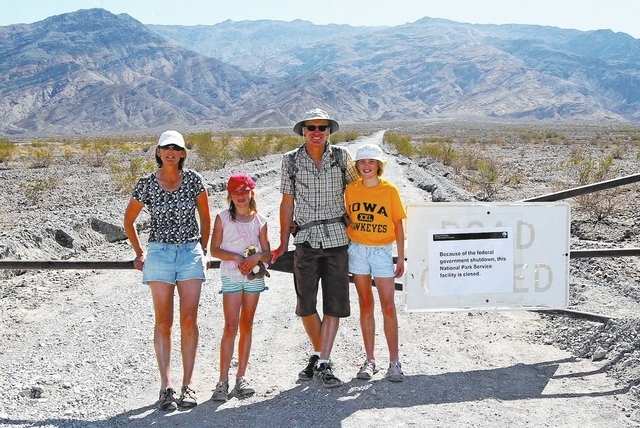Death Valley open after shutdown ends
FURNACE CREEK, Calif. — Death Valley National Park reopened to visitors Thursday after the 17-day federal government shutdown ended. While most campgrounds are open, a number of backcountry roads remain closed after summer washouts.
Visitors can access public areas and roads immediately while facilities and other public services are brought back online. Death Valley National Park has been closed since Oct. 1 due to the lapse in Congressional appropriations.
Xanterra, the concessionaire that operates the Furnace Creek Resort, remained open during the shutdown. The historic Furnace Creek Inn opened for the season Oct. 11.
Death Valley National Park spokesman Terry Baldino said the park has about 100 employees; all but 18 were furloughed during the shutdown, most remaining were law enforcement positions. Park officials said Death Valley National Park contributes more than $50 million to the local economy.
“We are excited and happy to be back at work and welcome visitors to Death Valley National Park,” said Superintendent Kathy Billings. “Autumn is just the beginning of a particularly special season to enjoy all that Death Valley has to offer.”
“The economic impact of closing this park for 16 days has been extremely tough on our gateway communities, local businesses, neighbors, and park partners,” Billing said. “We look forward to working with our neighbors and partners on ways to lesson that impact.”
Park facilities that have reopened include: Furnace Creek Visitor Center, Texas Springs Campground, Mesquite Springs Campground, Stovepipe Wells Village, Scotty’s Castle, and the park’s major scenic overlooks, and backcountry and wilderness. Sunset Campground opened Monday, while it is hoped Furnace Creek Campground will open Saturday, Baldino said crews were paving individual RV sites when the government shutdown occurred.
Travelers are advised to monitor backcountry conditions when traveling on Death Valley National Park Roads. A number of roads are closed. Badwater Road is closed from Badwater to the south entrance; Big Pine/Death Valley Road, Panamint Valley Road, Greenwater Valley Road and Saline Valley Road are closed by Inyo County due to flood damage; Cottonwood Canyon Road is impassible due to mud; Emigrant Canyon Road is closed due to flood damage,work is in progress to clear debris; Harry Wade Road, West Side Road and Wildrose Road are closed due to flood damage; Keane Wonder Road is closed and the mining area is closed to entry due to mine safety hazards; Steel Pass Road is impassable from Warm Springs to Steel Pass; Titus Canyon Road is open but motorists can expect flood damage, high clearance vehicles are recommended.
Baldino said a combination of circumstances led to delays in repairing the damage from the summer monsoons. He said the park only had four heavy equipment operators for over 200 miles of roads, then one operator retired, another succumbed to the heat. When the storms hit, Baldino said crews were repaving the parking lot and areas around Scotty’s Castle, in the northern part of the park.
“When the flood hit, we had access issues to the castle to clear, plus get equipment to Badwater where it was needed. Then through a lot of this mess we did lose an employee, one of our equipment operators, to heat-related illness, he died just before the closure,” Baldino said. “He was out grading the Westside Road to get it started, he had a flat tire on the grader and unfortunately was unable to communicate because the radio wasn’t working. He thought he could walk back to his truck during the heat of the day and he didn’t make it. That shut down everything until a review board could come in from the National Park Service, they bring a team from throughout the country that reviews things like that. That takes a week, then came the shutdown.”
Charles “Chuck” Caha, 64, died Sept. 19. He was a Pahrump resident for 22 years and a Navy veteran. A celebration of life was held in his honor at the Moose Lodge Sept. 28.
“Unfortunately about the Badwater Road, not only was there three miles of debris covering the road, which was hard to take care of, but we lost about 100 miles of road we’re just having to rebuild,” Baldino said. Parts of the road south of Badwater to the south entrance will be rebuilt as a dirt road with signings warning motorists, he said.
Baldino said with the tight budget situation there are a lot of vacancies, leaving park officials scrambling to prioritize which things are more important, maintaining backcountry roads, natural resource positions or other duties. Some employees have to work overtime to make up the workload, he said.
The road situation means the cancellation of the mule team and horseback ride from Ridgecrest, Calif. on the Friday morning of the annual 49ers Encampment, scheduled for Nov. 8-10 of this year. Baldino said they usually travel through Westside Road which is impassible, their permit was cancelled this year because there’s no physical way for them to get to the event through that area.
“There’s some areas where there’s close to six, seven feet of debris on the roads that needs to be removed. We feel between now and early November if we can get other roads open, other campgrounds open, that takes priority over Westside Road,” Baldino said.
A mule train, which will make its final run this year, leaves across from Terrible’s Lakeside Casino at the end of October, travels to Tecopa the first week, then will be transported to the Ashford Mine Road where they continue their trip into Death Valley for the 49ers encampment. A mule train which normally leaves at the same time from Ridgecrest, Calif., will not make the trip this year.
Death Valley National Park updates its website daily with road conditions. The web address is www.nps.gov/deva or visitors can call the park at 760-786-3200.
















